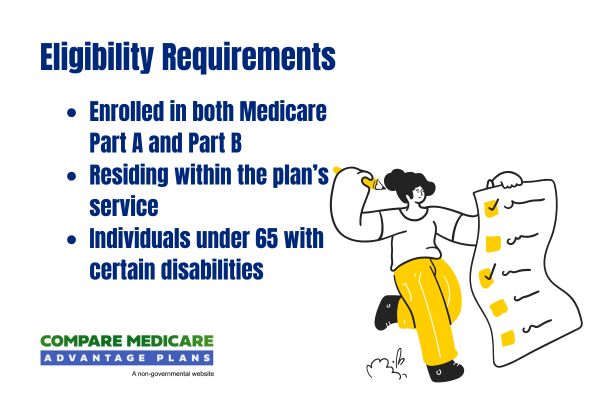UnitedHealthcare Medicare Advantage Plans in California 2026
Looking into the potential UnitedHealthcare Medicare Advantage Plans in California? This article provides a detailed overview of plan types, potential benefits, possible costs, and how to enroll. Discover how to choose the best plan for your needs.
Key Takeaways
- UnitedHealthcare will likely offer a diverse range of Medicare Advantage plans in California, including HMO, PPO, and SNP options, each tailored to specific healthcare needs and preferences.
- Some plans might integrate prescription drug coverage, potentially providing potential cost savings and comprehensive healthcare, and sometimes offering additional benefits like vision and dental services.
- Enrollment requires being on Medicare Parts A and B, with special plans for individuals with specific health needs; access to a large network of providers ensures convenient healthcare services.
Compare Plans in One Step!
Enter Zip Code
Overview of UnitedHealthcare Medicare Advantage Plans in California

UnitedHealthcare offers a variety of Medicare Advantage plans in California, including Health Maintenance Organization (HMO), Preferred Provider Organization (PPO), and Special Needs Plans (SNPs), each designed to cater to different healthcare needs. These plans integrate medical and hospital services, which could result in lower overall costs and added convenience.
UnitedHealthcare HMO Plans
Health Maintenance Organization (HMO) plans by UnitedHealthcare require members to select a primary care provider (PCP) who will coordinate all their healthcare needs. This model emphasizes coordinated care, where the PCP becomes the central point of contact for all medical services, including referrals to specialists. This will likely ensure that care is streamlined and consistent.
One of the potential benefits of HMO plans might be the use of a network of contracted providers for non-emergency services. Using in-network providers could help members keep their out-of-pocket costs low while benefiting from comprehensive coverage and coordinated care.
UnitedHealthcare PPO Plans
Preferred Provider Organization (PPO) plans offer greater flexibility compared to HMO plans. With a PPO plan, members can see any healthcare provider who accepts Medicare without needing a referral. This means you have the freedom to choose your doctors and specialists, both within and outside the network, although out-of-network services may come with higher costs.
PPO plans may be particularly beneficial for those who travel frequently or live in different states, as they provide nationwide access to healthcare providers. This flexibility ensures that you can receive the care you need, wherever you are, without worrying about network restrictions.
UnitedHealthcare Special Needs Plans (SNPs)
Special Needs Plans (SNPs) are designed specifically for individuals with certain health conditions or financial statuses. These plans offer tailored benefits and services to meet the unique needs of their members. For example, SNPs are available for individuals eligible for both Medicare and Medicaid, providing a comprehensive approach to healthcare.
Eligibility for SNPs is based on specific criteria, such as having chronic conditions like diabetes or heart failure, or being dual eligible (qualified for both Medicare and Medicaid). These plans ensure that members receive the specialized care and support they need to manage their health effectively.
Prescription Drug Coverage under UnitedHealthcare Medicare Advantage Plans

Some UnitedHealthcare Medicare Advantage plans might include integrated prescription drug coverage, possibly providing a comprehensive approach to managing medications alongside medical services. This potential integration could result in lower overall costs compared to standalone Part D plans, as it combines medical and prescription drug benefits in one package.
The specifics of prescription drug coverage, such as copays and coinsurance, may vary significantly among different plans and their formularies. Additionally, an extensive pharmacy network may also be available through UnitedHealthcare, potentially enhancing convenience for members.
Covered Services and Potential Benefits
Certain UnitedHealthcare Medicare Advantage plans may provide additional benefits that could extend beyond standard Medicare coverage. These benefits may include vision services, such as routine eye exams and eyewear, and dental care services, possibly ensuring comprehensive healthcare coverage.
Comparing Costs: UnitedHealthcare Medicare Advantage vs. Original Medicare
When comparing the potential costs of UnitedHealthcare Medicare Advantage plans to Original Medicare, it’s important to consider all potential expenses, including premiums, deductibles, copays, and out-of-pocket maximums. Some UnitedHealthcare Medicare Advantage plans might limit certain out-of-pocket maximum expenses, meaning that once you reach your maximum, the plan could cover up to 100% of additional costs for the rest of the year.
Original Medicare typically involves separate parts, which might lead to higher out-of-pocket costs if you need comprehensive coverage. Medicare Advantage plans, on the other hand, could bundle all the benefits under one plan, which could include prescription drug coverage and additional services not covered by Original Medicare.
Evaluating the total cost of healthcare could help in making an informed decision. By understanding the financial implications of each option, you can choose a plan that best suits your healthcare needs and budget.
How to Qualify and Enroll in UnitedHealthcare Medicare Advantage Plans

Qualification for UnitedHealthcare Medicare Advantage plans generally requires enrollment in Medicare Parts A and B. Individuals under 65 may also qualify if they are eligible for Medicare due to a disability or End-Stage Renal Disease. Special Needs Plans have further eligibility criteria, including specific health conditions or being dual eligible.
The enrollment process is straightforward. You can sign up during your Initial Enrollment Period when you first become eligible for Medicare or during the Annual Enrollment Period. Being informed about the specific requirements and changes ensures successful enrollment.
Access to Care and Contracted Network
UnitedHealthcare Medicare Advantage plans will likely offer access to a vast network of over 1.3 million healthcare professionals and 6,500 hospitals nationwide. This extensive network could potentially ensure that members can receive the necessary healthcare services conveniently and efficiently.
Before selecting a plan, it’s important to verify that your preferred healthcare providers are within the plan’s network to help avoid unexpected costs. Members can find in-network providers by signing into their accounts or using a guest directory. The comprehensive network provided by UnitedHealthcare will likely enhance the overall healthcare experience for members.
Emergency and Referral Procedures
In emergencies, UnitedHealthcare Medicare Advantage plans waive the requirement for referrals, allowing immediate access to necessary services at non-contracted facilities. This could ensure that members receive timely care without bureaucratic delays.
Choosing the Right Plan for Your Needs

Choosing the right Medicare Advantage plan will likely involve understanding your specific healthcare needs. If you require services like dental, hearing, or vision care, try looking for plans that might offer these benefits.
Summary
UnitedHealthcare Medicare Advantage plans will likely offer a comprehensive approach to healthcare, combining medical and prescription drug benefits with additional services like vision and dental care. By understanding the differences between these plans and Original Medicare, you can make an informed decision that best suits your needs and budget.
Choosing the right plan will likely involve considering your specific healthcare requirements, potential costs, and the possible benefits offered. With the extensive resources and support provided, you can navigate your Medicare journey with confidence and peace of mind.
Frequently Asked Questions
→ What types of UnitedHealthcare Medicare Advantage plans are available in California?
UnitedHealthcare Medicare Advantage plans in California include HMO, PPO, and Special Needs Plans (SNPs) to accommodate diverse healthcare requirements.
→ Do UnitedHealthcare Medicare Advantage plans include prescription drug coverage?
Yes, some UnitedHealthcare Medicare Advantage plans might include integrated prescription drug coverage, which could potentially lead to lower overall costs.
→ How do costs compare between UnitedHealthcare Medicare Advantage plans and Original Medicare?
Some UnitedHealthcare Medicare Advantage plans may offer lower out-of-pocket maximums and additional benefits compared to Original Medicare, possibly making them a potentially cost-effective choice for many beneficiaries.
→ What are the eligibility requirements for UnitedHealthcare Medicare Advantage plans?
To be eligible for UnitedHealthcare Medicare Advantage plans, you generally need to be enrolled in Medicare Parts A and B, with additional criteria for Special Needs Plans based on specific health conditions or financial status.
→ How can I find out if my preferred healthcare providers are in-network?
To determine if your preferred healthcare providers are in-network, log into your account or use the guest directory provided by your health plan. This will give you the most accurate and up-to-date information.

ZRN Health & Financial Services, LLC, a Texas limited liability company



